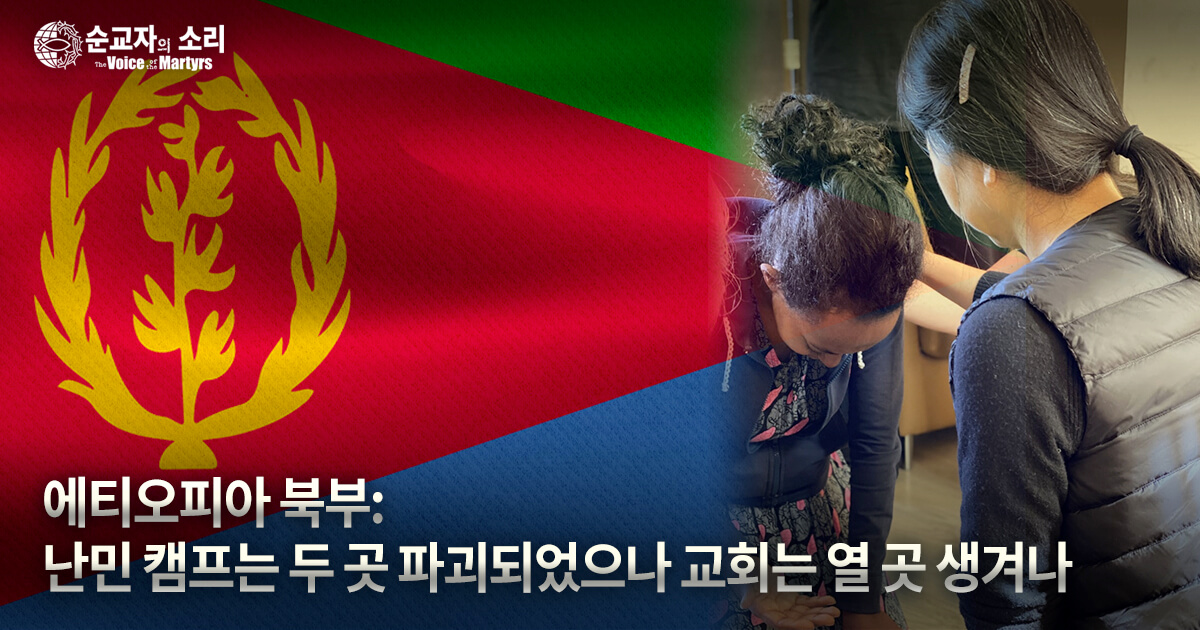
NORTHERN ETHIOPIA: AS TWO REFUGEE CAMPS ARE DESTROYED, TEN NEW CHURCHES FORM
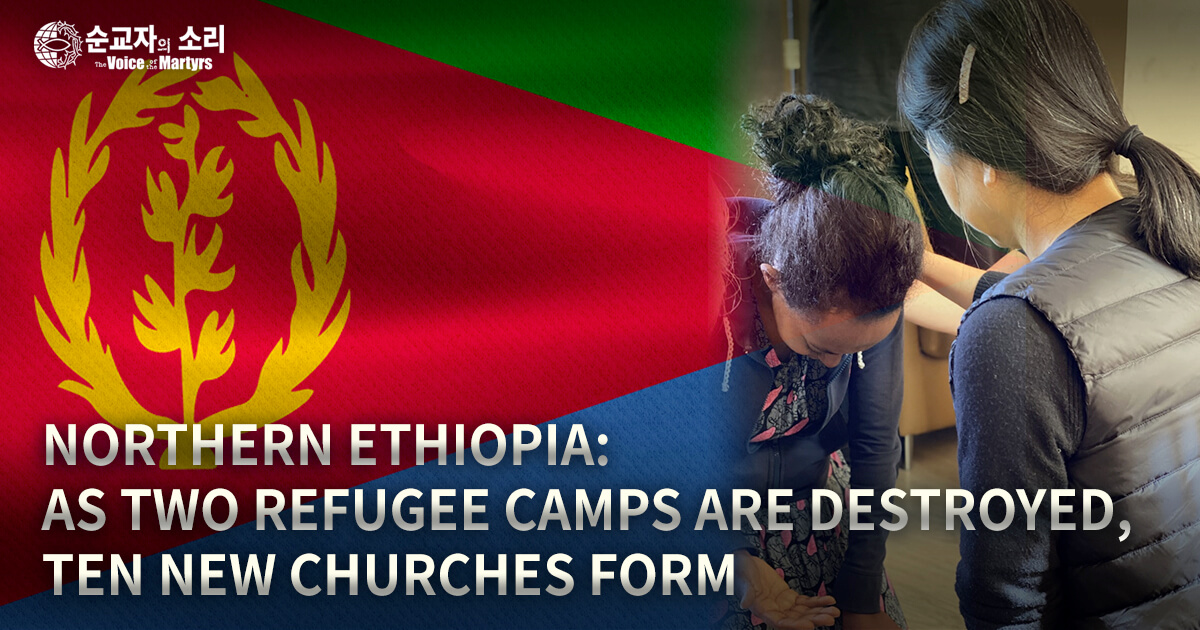
As heavy fighting in the northern Ethiopian region of Tigray continues into its ninth month, the UN’s Special Rapporteur on human rights in Eritrea has “sounded the alarm” calling for prompt UN investigation of what he is calling the “horror stories” of Eritreans fleeing the destruction of two refugee camps in the region. But amidst the horror, Voice of the Martyrs Korea is calling attention to signs of new life: Ten new churches have formed as Eritrean Christian refugees begin the work of putting their lives back together outside the camps.
“We typically think of church planting as something that occurs under optimal social conditions,” says Voice of the Martyrs Korea Representative Dr. Hyun Sook Foley. “But the New Testament consistently shows that churches are formed like stars: Under immense pressure in clouds of swirling chaos. That’s certainly what’s happening in the case of these new refugee churches in Ethiopia.”
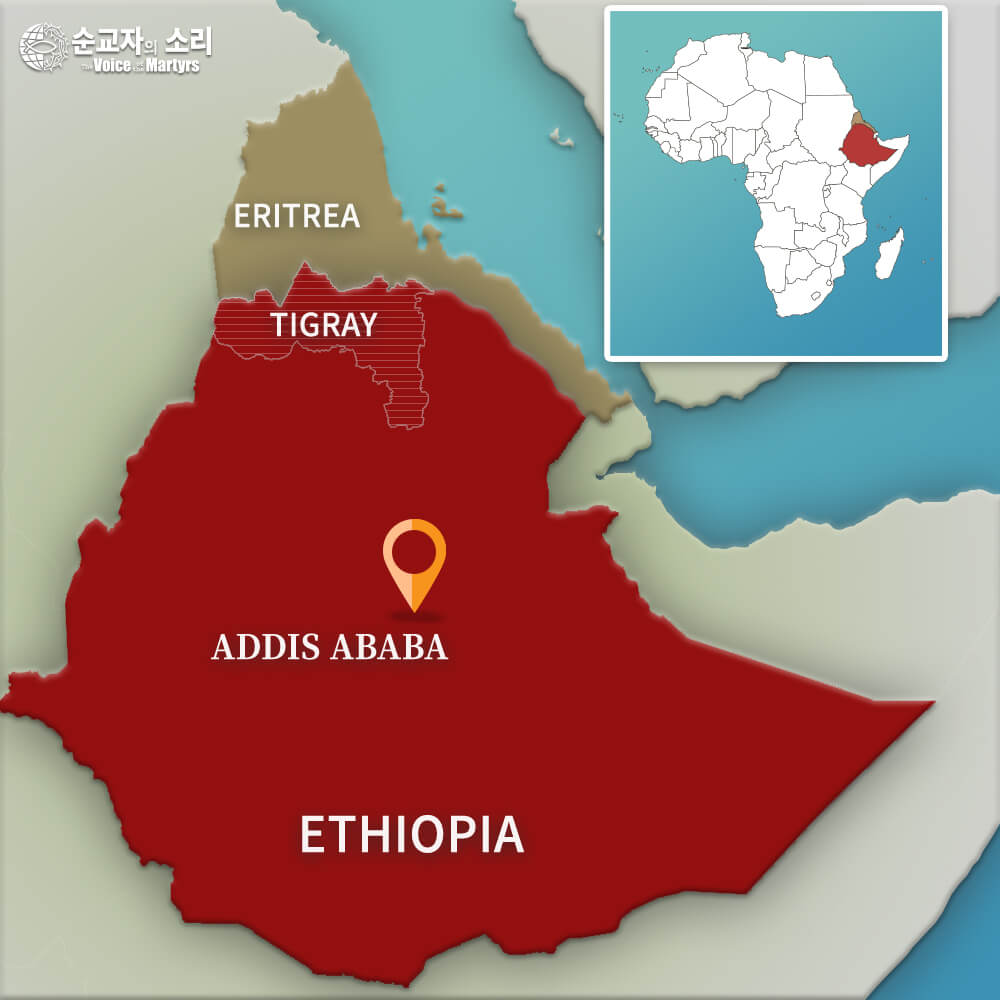
An estimated 20,000 Eritrean refugees forced from two camps in the Tigray region of Northern Ethiopia are now missing. Reports say thousands have been kidnapped back into Eritrea while thousands more have fled to other cities in Ethiopia.
Representative Foley says these new church plants should not be celebrated naively or idealistically by Christians in other parts of the world. “I think very few Christians around the world have ever experienced the kind of absolute dependence on Christ that has brought these new Eritrean refugee congregations together. These are ten groups of Christians clinging to each other and to God because everything else in their lives is shattered, splintered, and burning. Like the disciples in the Upper Room, they are meeting behind locked doors in whatever cities they can reach and whatever rooms they can afford. They are encouraging each other in the Word, because the Word is all they have left. Even in the big cities like Addis Ababa where many of the refugees are fleeing, it is impossible for them just to ‘blend in’: Ethnic tensions are soaring due to the conflict in the northeast, so Protestant Christians of Tigrinian ethnicity and Eritrean citizenship like them are viewed with deep suspicion and even hatred by the majority ethnic groups of Muslim and Orthodox background in whose neighborhoods they are forced to hide.”
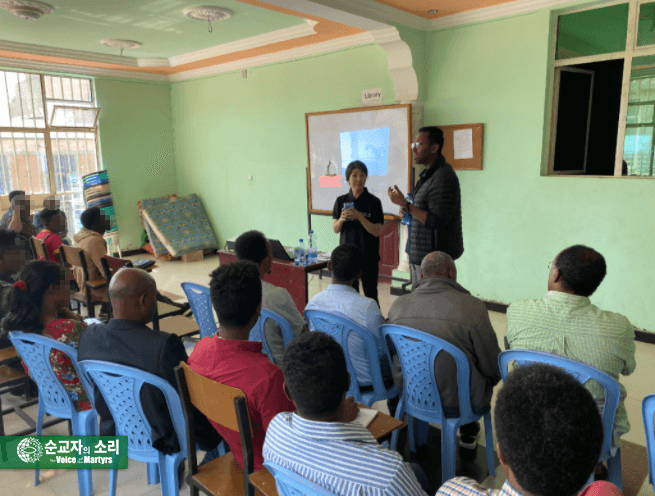
Voice of the Martyrs Korea Representative Dr. Hyun Sook Foley does a trauma recovery training with Eritrean refugees in Tigray in 2019, shortly before the conflict broke out.
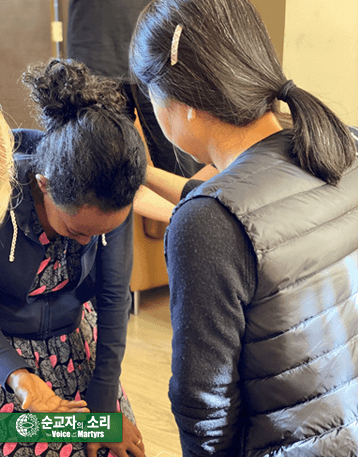
Representative Foley prays with an Eritrean widow, whose husband died in prison due to his faith in Jesus Christ. Reports say thousands of Eritrean refugees have been repatriated to Eritrea during the current conflict.
Representative Foley says that the reports by Mohamed Abdelsalam Babiker, the UN Special Rapporteur on the situation of human rights in Eritrea, on the situation facing the estimated 25,000 Eritrean refugees displaced by the destruction of the Hitsats and Shimelba refugee camps match the reports that Voice of the Martyrs Korea is receiving from its own long-time Eritrean and Ethiopian partners. “Based on eyewitness testimonies as well as the report from the UN High Commission on Refugees Commissioner to the region, the Special Rapporteur told the UN in June that he is ‘sounding the alarm’ and calling for immediate UN investigation into what he calls ‘clear and consistent patterns’ that these refugee camps were being ‘specifically targeted’ for horrific abuses by Eritrean troops fighting alongside Ethiopian National Defense Forces. He said, ‘As many as 20,000 Eritrean refugees were missing’ after they were ‘left for months without food, water, medical supplies or other basic necessities’. The specific ‘alarm’ that the Special Rapporteur sounded was due to what he called ‘horrifying reports of sexual and gender-based violence, and of Eritrean refugees in Tigray being kidnapped, killed, attacked and prevented from fleeing’.”
Representative Foley says that reports from a long-time Voice of the Martyrs Korea partner from Tigray add another layer of concern. “He wrote, ‘Thousands of Eritreans were taken by the Eritrean government back to Eritrea. Some of them are Christians. When they arrived in Eritrea, some were sent to prison, and some were taken to military camp as soldiers because they were soldiers before they came to Ethiopia.’”
But Representative Foley says that reports confirm that thousands of other Eritrean refugees escaped, fleeing to other cities in Ethiopia. “It is from this massive refugee pool that ten new Eritrean refugee churches in Addis Ababa have formed. All over Ethiopia, Christ is comforting his people–not only these refugees but others whose lives have been turned upside down by this Tigray conflict. People are gathering in the churches. They’re grieving at the churches. They are bringing dead bodies to the churches to bury them in mass graves. Christ is still making a way for people to have hope.”
Representative Foley says that Voice of the Martyrs Korea has so far sent 13,500,000 KRW in 2021 to aid Eritrean Christian refugees in Ethiopia and the families of Eritrean Christians imprisoned or martyred in Eritrea, with additional transfers planned for the third and fourth quarters of the year based on donations received. Representative Foley says that donations made this month to Voice of the Martyrs Korea Families of Martyrs and Prisoners fund will be used to support this ongoing Eritrean work.
Donation to VOMK’s Families of Martyrs and Prisoners (FOM/FOP) fund can be made at www.vomkorea.com/en/donation or via electronic transfer to:
국민은행 (KB Bank): 463501-01-243303
예금주 (Account Holder): (사)순교자의소리
Please include the name “FOM/FOP” on the donation.
For more information on Voice of the Martyrs Korea’s partnership with Eritrean underground Christians, please visit www.vomkorea.com/en/country-profile/eritrea.
Voice of the Martyrs recorded this video of an Eritrean refugee camp during a visit to the Tigray region of Northern Ethiopia in 2017 to train Eritrean Christian refugees. Two of the four Eritrean refugee camps in the region were destroyed in the current conflict.

